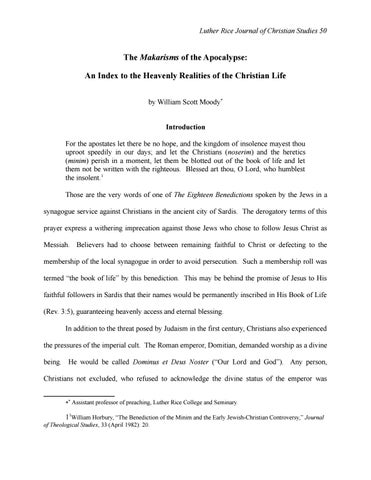Luther Rice Journal of Christian Studies 50
The Makarisms of the Apocalypse: An Index to the Heavenly Realities of the Christian Life by William Scott Moody Introduction For the apostates let there be no hope, and the kingdom of insolence mayest thou uproot speedily in our days; and let the Christians (noserim) and the heretics (minim) perish in a moment, let them be blotted out of the book of life and let them not be written with the righteous. Blessed art thou, O Lord, who humblest the insolent.1 Those are the very words of one of The Eighteen Benedictions spoken by the Jews in a synagogue service against Christians in the ancient city of Sardis. The derogatory terms of this prayer express a withering imprecation against those Jews who chose to follow Jesus Christ as Messiah. Believers had to choose between remaining faithful to Christ or defecting to the membership of the local synagogue in order to avoid persecution. Such a membership roll was termed “the book of life” by this benediction. This may be behind the promise of Jesus to His faithful followers in Sardis that their names would be permanently inscribed in His Book of Life (Rev. 3:5), guaranteeing heavenly access and eternal blessing. In addition to the threat posed by Judaism in the first century, Christians also experienced the pressures of the imperial cult. The Roman emperor, Domitian, demanded worship as a divine being. He would be called Dominus et Deus Noster (“Our Lord and God”). Any person, Christians not excluded, who refused to acknowledge the divine status of the emperor was Assistant professor of preaching, Luther Rice College and Seminary.
11William Horbury, “The Benediction of the Minim and the Early Jewish-Christian Controversy,” Journal of Theological Studies, 33 (April 1982): 20.

